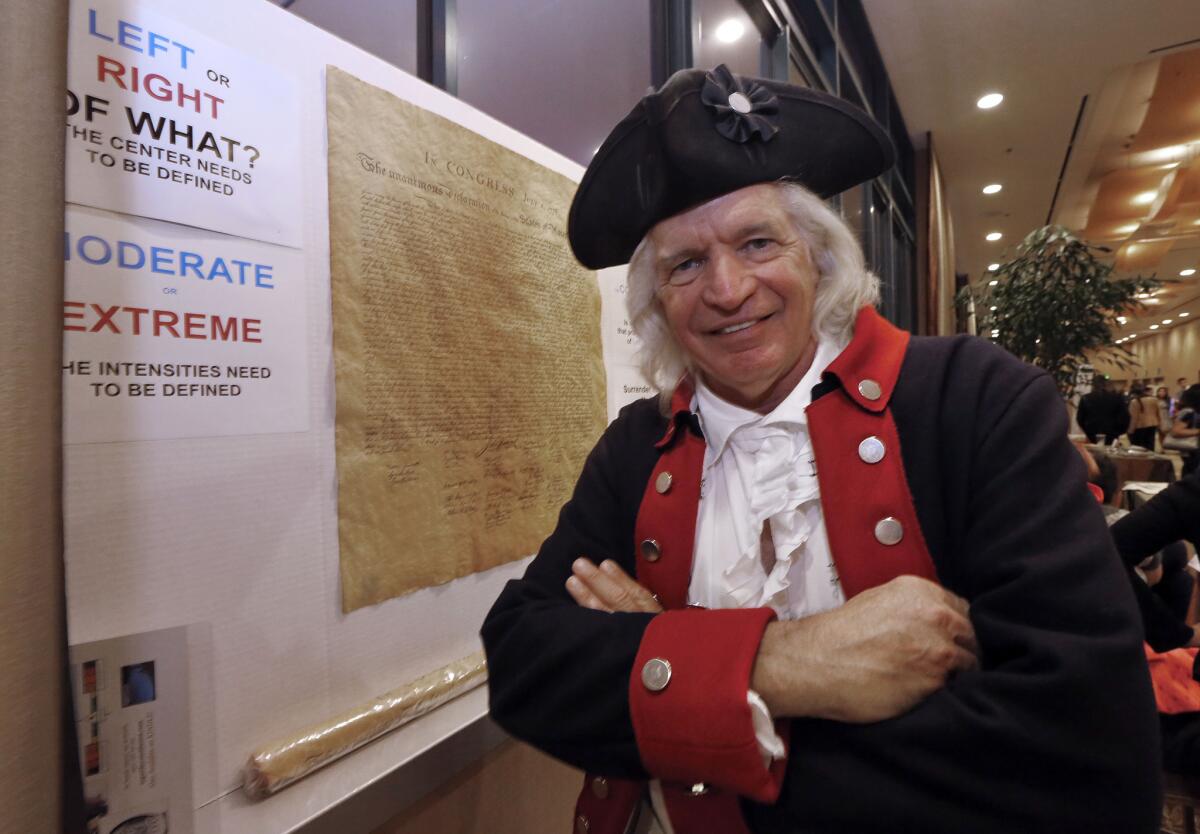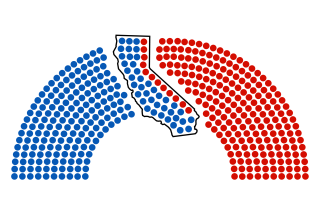California Republicans: Little visible headway expanding voter base

Six months after national Republicans issued a brutal self-assessment intended to cut their own path out of the wilderness, the limits of their progress were sharply apparent during the weekend state Republican convention.
The report criticized Republicans for holding to the approaches advocated in the Ronald Reagan era without “figuring out what comes next”; the Anaheim convention featured the ritual genuflections to Reagan with rare mentions of successful politicians since.
The report called for flexibility on issues that have confounded Republican efforts to reach out to potent voter groups — “Policy always matters,” it said. No substantive changes were offered this weekend.
In short, Republicans once again decided that the problem wasn’t the message so much as the flawed messengers who have voiced it. Or, as Republican National Committee co-chair Sharon Day put it, in offering a soft-focus look back at the report, “It wasn’t that we found our message toxic as much as that we just had not done our work.”
PHOTOS: 2013’s memorable political moments
Throughout the three days of sessions, much was made of the RNC’s decision to finance a new data-driven operation to try to blunt a Democratic advantage in finding willing voters and getting them to the polls. And that effort, also recommended in the report that came out of the party’s 2012 presidential loss, may indeed prove important, particularly in a few key competitive races Republicans are focusing on next year.
But there was little talk, publicly at least, about what the pitch would be when those voters were found.
Papering over fundamental disputes is often a necessary thing for political parties; an uneasy alliance of occasionally warring brethren usually beats a familial civil war, particularly when the family constitutes less than 30% of a state’s registered voters. And much effort was made over the weekend to unify the party via its common enemies — most often, President Obama, Senate Democratic leader Harry Reid and former House Speaker Nancy Pelosi.
But underneath, persistent challenges remain.
One is cultural — the party remains split between the moderately pragmatic and the socially conservative, between those who embrace compromise and those who see it as stinting on principles. (Democrats have largely put aside their own schisms, though that pendulum may swing back in the 2016 presidential contest).
The second is demography, particularly in a state that is rapidly looking less and less like the typical Republican voter.
The stances of the party’s congressional leaders have complicated efforts in California and nationally to attract the party’s two most important target groups, women and Latinos.
Women in California have been the backbone of Democratic success; California Democratic politicians were among the first to pounce when, just before the government shutdown, Republicans in Washington again sought to broaden the rights of employers to deny contraception coverage to employees. (Women voters have long gone for party and policy over gender, most recently spurning California Republicans’ female governor and U.S. Senate candidates in 2010.)
Latino outreach was particularly fraught at the convention because of outright hostility toward gubernatorial candidate Abel Maldonado, the former lieutenant governor. Republicans brushed aside his contention that his Mexican heritage would make him a formidable candidate, focusing instead on his many breaks with party orthodoxy and lingering animosity over a long-ago tax vote. An alternative, Assemblyman Tim Donnelly of Twin Peaks, is a former member of the Minuteman border patrol.
Immigration reform, a threshold issue for many Latinos and one that has been bottled up in the Republican-controlled House, was barely mentioned. But delegates approved a measure that called for voters to have to identify themselves at polling places, a watered-down version of a move that Latino and black voter groups see as aimed at them. And convention delegates gave keynote speaker and Texas Gov. Rick Perry their loudest support when he ticked a brief list of things he said Washington needed to focus on. First: “Secure the borders.”
(Twice during the convention, organizers played a video of an African American lawmaker from Louisiana who recently switched from Democrat to Republican. Elbert Guillory lambasted Democrats as “our overseers” who doled out social services to “control the black community”; he asked others to join with him in “abandoning the government plantation.” His praise of Republican efforts to enhance the rights of blacks omitted anything after 1957.)
Another difficulty for the party is the accumulation of factors potentially influencing its targeted voters: Even if Latinos surmount their differences with Republicans on immigration reform, they would be confronted by a party trying to gut the nation’s healthcare plan, which is overwhelmingly popular among Latinos and blacks, as well as women and Asian voters, another target audience.
While convention organizers in Anaheim offered optimistic projections about their chances in the 2014 elections, their limited reach was notable: There was almost none of the usual year-before-election focus on big statewide races; the acknowledged goals of the party were to secure — and perhaps add to — its outmanned congressional delegation, to seek to limit the Democratic party’s overwhelming advantage in Sacramento, and to build a farm team for somewhere down the road.
In their search for expansion, heavy with data-mining and electronic outreach, Republicans appeared to be underselling the human component, as if voters were online dating prospects who would be more entranced by the technology of connection than whether there was any actual attraction to a mate.
Follow Politics Now on Twitter and Facebook
Twitter: @cathleendecker
More to Read
Start your day right
Sign up for Essential California for news, features and recommendations from the L.A. Times and beyond in your inbox six days a week.
You may occasionally receive promotional content from the Los Angeles Times.







